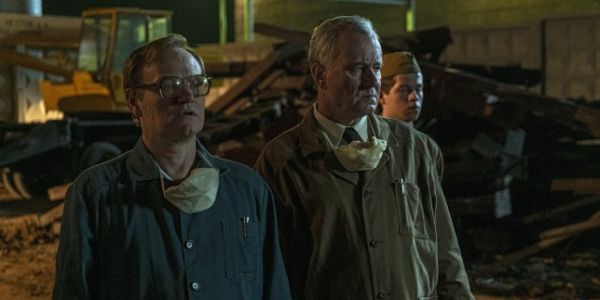The HBO and Sky Atlantic joint venture Chernobyl series is now halfway through its life span with its third episodic entry ‘Open Wide, O Earth’. A more appropriate title if I’ve ever seen one considering how this latest episode plays out. Chernobyl, while having a slow start concerning viewership, has gained a slow albeit substantial amount of acclaim and precedent via word of mouth after the horrifyingly tantalising cliffhanger of its previous episode playing out in the same vein as a horror show.
Chernobyl, written completely in its entirety by Craig Mazin, left its viewers in a haunted daze by leaving the three ill-fated volunteers in complete darkness, void of light and engulfed in radiated air and water. This episode picks up seconds after those petrifying final moments. Finding these three character in the pits of hell, with little to no hope for success.
The Extent of Sacrifice Is Deeply Powerful
What Chernobyl’s‘ third episode conveys extremely efficiently in such a devastating fashion is the extent of the level of sacrifice. From the singular action of a person to the stride of over four hundred. The level and intensity of what these people will sacrifice for societal or patriotic reasons are in its own right utterly fascinating. The human condition and the loyalty it has to itself and the difference to that and upon to others is such a stark difference and the exploration of such here is remarkably engrossing.

While the series has had subtle elements of class structure and patriarchal levels of discrimination present, it is here where it takes a more present and hard-hitting volume. The subtext of what Mazin is trying to say remains slightly ambiguous regarding the political motivation of his characters. Is it because their dedication to the flag is truly authentic, or is a darkly forceful systematic agenda at play?
It’s a thread that is undoubtedly questioned, even from those who have been commissioned to commence an inquest into the tragedy, that of the Kremlin themselves. It’s a captivating and deeply interesting thread that seems to be setting itself up for more of a far greater reveal down the line, however, we’re still given slight cues for the growing impact it has caused.
Woven Threads
That being said the threads have begun to be woven and the deeper more frightful impact of this event, more so politically, is in full effect. We’re beginning to see the moral compass of the society this event damaged and the effects of such a colossal event has had on a larger platform in the nation and throughout the world. The classically natured irony of the old dictating to the young with their lives like pennies thrown into the street is beginning to engulf this series. While the rich and politically immersed take pride in pushing a few buttons and taking the plaudits with critical acclaim on their minds, the antithesis is the innocent ordinary men and women risking their lives fixing a problem that is exacerbating to a larger extent with every second, and killing them even quicker.
It’s both saddening and morbid to witness but a much-needed thread to be exercised/shown on screen. The real tragedy here is the nameless heroes who died protecting and serving a society who don’t even know their names. If you’re not left sickened by this, you’re made of stone. The magnitude of pain these nameless and thankless people put themselves through for the greater good is traumatising to watch. Especially the thread concerning Jessie Buckley’s Lyudmilla Ignatenko. Seeing the devastation in her voice and face while watching her husband Vasily Ignatenko played by Adam Nagaitis deteriorate into this dissolving wasting embodiment is excruciatingly painful to witness. The devastation is heavily vivid and the subtle limited dialogue in each sequence speaks for itself in far greater volume than any heavy-handed visual ploy needed.
Conclusion
The episode splits itself into two main arcs. One on-site at Chernobyl with Valery Legasov (Harris) and Boris Shcherbina (Skarsgård) trying to still control the nuclear rupture and the other; investigating the event off-site with Ulana Khomyuk (Watson), who is still trying to find answers from those affected by the blast. The narrative split is edited perfectly by Jinx Godfrey and Simon Smith. Both threads are increasingly haunting as they develop. It coincides with this truly disastrous physical embodiment of both the Nuclear plant itself, and its victims slowly becoming one. A parallel line of pain, misery and death that is slowly becoming an unsolvable problem with no real idea of future resolve.
We’re left watching these characters try to decipher this issue that is beginning to threaten the planet and they’re dumbfounded with any idea how to rectify it. You’re left helpless with this ghoulish and grisly wave of inevitably wrapping around you and suffocating any possible hope for tranquillity, but you can’t for the life of you take your eyes away from it all.
Are you watching Chernobyl? How long have you been reading the Wikipedia page, honestly? Let us know in the comments below!
Chernobyl continues on HBO and Sky Atlantic every Monday.
Does content like this matter to you?
Become a Member and support film journalism. Unlock access to all of Film Inquiry`s great articles. Join a community of like-minded readers who are passionate about cinema - get access to our private members Network, give back to independent filmmakers, and more.